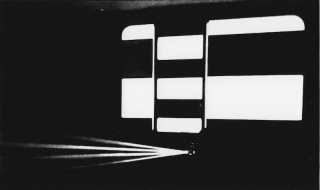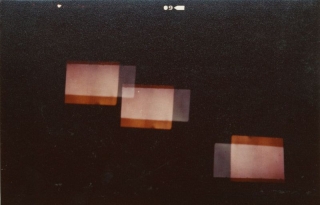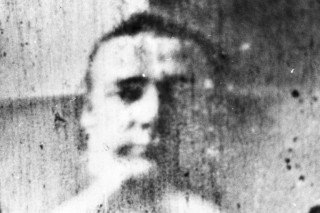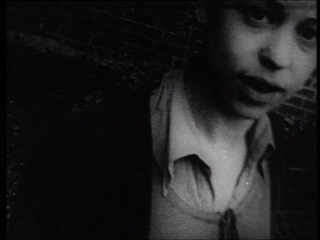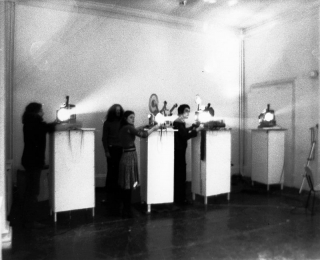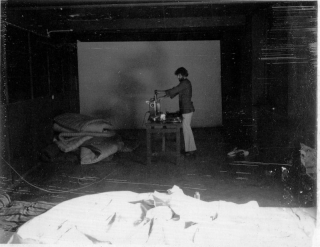Date: 4 November 2016 | Season: Shoot Shoot Shoot 2016 | Tags: Shoot Shoot Shoot
SHOOT SHOOT SHOOT: THE LONDON FILM-MAKERS’ CO-OP
Friday 4 November 2016, at 7pm
Cambridge Harvard Film Archive
To celebrate the 50th anniversary of the London Film-Makers’ Co-operative, this screening presents a selection of work by some of innovative film artists that gathered there in its formative years: David Crosswaite, Marilyn Halford, Malcolm Le Grice, Mike Leggett, Annabel Nicolson, William Raban, Lis Rhodes and John Smith.
Inspired by the example set by Jonas Mekas and his colleagues in New York, the London Co-op was founded in 1966. In contrast to similar organizations, the LFMC’s activity was not limited to distribution – within a few years it was running a regular program in its own cinema and, most notably, had a workshop in which filmmakers could control every stage of the creative process.
The workshop housed a continuous processor and step printer and was an essential, contributory factor in steering the direction of the uncompromising films produced at the LFMC in the 1970s. The tendency was defined by as ‘structural/materialist’ by one of the group’s leading polemicists, Peter Gidal, alluding to what was then the dominant mode in avant-garde cinema but adding a qualification that suggests both Marxist philosophy and the physical presence of the medium that was foregrounded in British filmmaking.
A second, and equally significant form of practice was expanded cinema, which made creative use of the mechanics of projection in the presentation of multi-screen films and performance works. Light Music by Lis Rhodes is exemplary in this regard. Two projectors face each other across the room, creating an environment in which the audience is participant. Its abstract imagery (an ever-changing array of horizontal lines composed as a musical score) is printed across the frame and optical soundtrack area of a 16mm film print, enabling it to be both seen and heard.
The program will be introduced by Mark Webber, author of Shoot Shoot Shoot: The First Decade of the London Film-Makers’ Co-operative 1966-76 (LUX, October 2016) and co-editor of Flare Out: Aesthetics 1966–2016, a collection of essays by Peter Gidal issued by The Visible Press in April 2016.
Annabel Nicolson, Frames, 1973, 18fps, color, silent, 8 min
Marilyn Halford, Footsteps, 1975, b/w, sound, 7 min
Mike Leggett, Shepherd’s Bush, 1971, b/w, sound, 15 min
David Crosswaite, Film No. 1, 1971, color, sound, 10 min
John Smith, Associations, 1975, color, sound, 7 min
William Raban, Broadwalk, 1972, color, sound, 12 min
Malcolm Le Grice, Reign of the Vampire, 1970, b/w, sound, 16 min
Lis Rhodes, Light Music, 1975, 2 screen, b/w, sound, 20 min
Following the screening in the HFA Cinematheque, the special presentation of Lis Rhodes’ Light Music will take place in the undercroft of the Le Corbusier designed Carpenter Center.
PROGRAMME NOTES
SHOOT SHOOT SHOOT: THE LONDON FILM-MAKERS’ CO-OP
Friday 4 November 2016, at 7pm
Cambridge Harvard Film Archive
FRAMES
Annabel Nicolson, UK, 1973, 16mm, 18fps, color, silent, 8 min
“The original was standard 8mm material that I’d shot in a village in Italy. The material had gone through a process of deterioration. I’d used it in performing and taken it through an old Russian slide projector. I took the lens out of this projector so I could pull the film strip through it, and that meant the image could be focused on different surfaces. Instead of the image falling onto a screen I could direct it around the room with the lens in my hand. In the process it got very torn and scratched and it was that material I eventually put in the contact printer and made into the 16mm film Frames.” (Annabel Nicolson)
FOOTSTEPS
Marilyn Halford, UK, 1975, 16mm, b/w, sound, 6 min
“Footsteps is in the manner of a game re-enacted, the game in making was between the camera and actor, the actor and cameraman, and one hundred feet of film. The film became expanded into positive and negative to change balances within it; black for perspective, then black to shadow the screen and make paradoxes with the idea of acting, and the act of seeing the screen. The music sets a mood then turns a space, remembers the positive then silences the flatness of the negative.” (Marilyn Halford)
SHEPHERDS BUSH
Mike Leggett, UK, 1971, 16mm, b/w, sound, 15 min
“Shepherd’s Bush was a revelation. It was both true film notion and demonstrated an ingenious association with the film-process. It is the procedure and conclusion of a piece of film logic using a brilliantly simple device; the manipulation of the light source in the Film Co-op printer such that a series of transformations are effected on a loop of film material. From the start Mike Leggett adopts a relational perspective according to which it is neither the elements or the emergent whole but the relations between the elements (transformations) that become primary through the use of logical procedure.” (Roger Hammond)
FILM NO. 1
David Crosswaite, UK, 1971, 16mm, b/w & color, sound, 10 min
“The systems of super-imposed loops are mathematically inter-related in a complex manner. The starting and cut off points for each loop are not clearly exposed, but through repetitions of sequences in different colors, in different ‘material’ realities (i.e. a negative, positive, bas-relief, neg-pos overlay) yet in constant rhythm (both visually and on the soundtrack hum) one is manipulated to attempt to work out the system structure … The film deals with permutations of material, in a prescribed manner but one by no means ‘necessary’ or logical (except within the film’s own constructed system/serial).” (Peter Gidal)
ASSOCIATIONS
John Smith, UK, 1975, 16mm, color, sound, 7 min
“Images from magazines and color supplements accompany a spoken text taken from Word Associations and Linguistic Theory by the American psycholinguist Herbert H Clark. By using the ambiguities inherent in the English language, Associations sets language against itself. Image and word work together/against each other to destroy/create meaning.” (John Smith)
BROADWALK
William Raban, UK, 1972, 16mm, color, sound, 12 min
“Originally, this was a four-minute time-lapse film which was shot continuously over a twenty-four hour period. The camera was positioned on a busy pathway in Regent’s Park, and recorded three frames a minute. The shutter was held open for the twenty-second duration between exposures, so that on projection, individual frames merge together making the patterned flows of human movement clearly perceptible. The time-lapse original was then expanded by various processes of re-filming to reveal the frame-by-frame structure of the original.” (William Raban)
REIGN OF THE VAMPIRE
Malcolm Le Grice, UK, 1970, 16mm, b/w, sound, 11 min
“This film could be considered as a synthesis of the ‘How to Screw the CIA’ series. It is formally based on the permutative loop structure, superimposing a series of three pairs of image loops of different lengths with each other. The images include elements from all the previous parts of the series. The film sequences which make up loops, are again chosen for their combination of semantic relationships, and abstract factors of movement. The soundtrack is constructed for the film, but independently, and has a similar loop structure.” (Malcolm Le Grice)
– intermission –
LIGHT MUSIC
Lis Rhodes, UK, 1975-77, 2 x 16mm, b/w, sound, 20 min
“The film is not complete as a totality; it could well be different and still achieve its purpose of exploring the possibilities of optical sound. It is as much about sound as it is about image; their relationship is necessarily dependent as the optical soundtrack ‘makes’ the music. It is the machinery itself which imposes this relationship. The image throughout is composed of straight lines. It need not have been.” (Lis Rhodes)
Back to top
Date: 24 November 2016 | Season: Shoot Shoot Shoot 2016 | Tags: Shoot Shoot Shoot
SHOOT SHOOT SHOOT: THE LONDON FILM-MAKERS’ CO-OP
Thursday 24 November 2016, at 7pm
Brighton Sallis Benney Theatre
The LFMC was founded in October 1966 as a non-commercial distributor and film laboratory for avant-garde cinema. Within this unique facility, film-makers were able to control every aspect of the creative process. Many explored the material aspects of celluloid, whilst others experimented with multiple projection and performance-based ‘expanded cinema’. This artist-led organisation asserted the significance of British work internationally, and anticipated today’s vibrant culture of artists’ moving image. This programme features 16mm film works by Malcolm Le Grice, Lis Rhodes, Jeff Keen, Guy Sherwin, Gill Eatherley, Annabel Nicolson and others.
Malcolm Le Grice, Berlin Horse, 1970, 9 min
Lis Rhodes, Dresden Dynamo, 1971-72, 4 min
Jeff Keen, Marvo Movie, 1967, 5 min
Guy Sherwin, At the Academy, 1974, 5 min
Peter Gidal, Hall, 1968-69, 8 min
Annabel Nicolson, Slides, 1971, 12 min
Sally Potter, Play, 1970, 7 min, 2 screen
William Raban, Diagonal, 1970, 5 min, 3 screen
Gill Eatherley, Hand Grenade, 1971, 8 min, 3 screen
The book Shoot Shoot Shoot: The First Decade of the London Film-Makers Co-operative 1966-76 (LUX, 2016), edited by Mark Webber, has been published by LUX to celebrate the LFMC’s 50th anniversary, it brings together texts, interviews, images and a large number of archival documents in exploring the history of the early years of the organisation.
Date: 15 January 2017 | Season: Shoot Shoot Shoot 2016 | Tags: Shoot Shoot Shoot
DAVID LARCHER: MARE’S TRAIL
Sunday 15 January 2017, at 7pm
London Close-Up Film Centre
One of the forgotten masterpieces of British avant-garde cinema. David Larcher’s epic film was assembled from quasi-autobiographical footage, shot over several years, that was processed, manipulated and edited into a dense, durational viewing experience. Generously employing assorted optical and aural trickery, Mare’s Tail unravels into a 2½ hour anarcho-mystical voyage of psychedelic revelation.
“From one flick of the mare’s tail came an unending stream of images out of which was crystallised the milky way.” (David Larcher)
Though made independently of the London Film-Makers’ Co-operative, the visual ingenuity and ambitious scope of Mare’s Tail made it a key contribution to the UK’s nascent experimental film scene. Containing footage that dates back to Larcher’s time as an RCA student in the mid-1960s, the film was completed some years later with funds provided by producer/patron Alan Power. It received its world premiere at the 1969 Edinburgh Film Festival and was the opening film for the IRAT Cinema at the Robert Street New Arts Lab.
David Larcher, Mare’s Tail, 1969, 16mm, colour, sound, 143 min
This rare 16mm screening is organised by LUX and Close Up to mark the publication of Shoot Shoot Shoot: The First Decade of the London Film-Makers’ Co-operative 1966-76, a compendium of texts, interviews, images and documents from the era.
PROGRAMME NOTES
DAVID LARCHER: MARE’S TRAIL
Sunday 15 January 2017, at 7pm
London Close-Up Film Centre
MARE’S TAIL
David Larcher, 1969, 16mm, colour, sound, 143 min
“Mare’s Tail is an epic flight into inner space. It is a 2 and 3/4 hour visual accumulation in colour, the filmmaker’s personal odyssey, which becomes the odyssey of each of us. It is a man’s life transposed into a visual realm, a realm of spirits and demons, which unravel as mystical totalities until reality fragments. Every movement begins a journey. There are spots before your eyes, as when you look at the sun that flames and burns. We look at distant moving forms and flash through them. We drift through suns; a piece of earth phases over the moon. A face, your face, his face, a face that looks and splits into shapes that form new shapes that we rediscover as tiny monolithic monuments. A profile as a full face. The moon again, the flesh, the child, the room and the waves become part of a hieroglyphic language …
Mare’s Tail is an important film because it expresses life. It follows Paul Klee’s idea that a visually expressive piece adds ‘more spirit to the seen’ and also ‘makes secret visions visible’. Like other serious films and works of art, it keeps on seeking and seeing, as the filmmaker does, as the artist does. It follows the transience of life and nature, studying things closely, moving into vast space, coming in close again. The course it follows is profoundly real and profoundly personal: Larcher’s trip becomes our trip to experience. It cannot be watched impatiently, with expectation; it is no good looking for generalization, condensation, complication or implication.”
—Stephen Dwoskin, Film Is: The International Free Cinema, 1975
Back to top
Date: 23 January 2017 | Season: Shoot Shoot Shoot 2016 | Tags: Gregory Markopoulos, Shoot Shoot Shoot
SHOOT SHOOT SHOOT: THE LONDON FILM-MAKERS’ CO-OP
Monday 23 January 2017, at 6:30pm
Glasgow CCA
50th anniversary talk and book launch presented by LUX Scotland
In late 1966, a manifesto announcing the formation of the London Film-Makers’ Co-operative was published in the first issue of the organisation’s magazine Cinim:
LONDON FILM-MAKERS COOP ABOUT TO BE LEGALLY ESTABLISHED STOP PURPOSE TO SHOOT SHOOT SHOOT SHOOT SHOOT STOP NEVER STOP NO BREAD NO PLACE TO LAY OUR HEADS NO MATTER JUST MIND IF YOU WANT TO MAKE MONEY STOP IF YOU LIKE BRYAN FORBES STOP IF YOU READ SIGHT AND SOUND STOP IF YOU WANT TO MAKE FILMS I MEAN FILMS COME ALL YOU NEEDS IS EYES IN THE BEGINNING STOP GEN FROM 94 CHARING CROSS ROAD W.C.2 PARTURITION FINISHED SCREAMS BEGIN STOP
This memo was dispatched from the LFMC’s first base at Better Books, a shop on London’s Charing Cross Road, where the organisation evolved from a film society into a distributor of experimental and non-commercial films. The ambition to stimulate the production of new work was there from the beginning, but it was to take a few more years for the Co-op to establish its own film workshop, a unique facility in which its filmmakers fashioned a radically new form of cinema.
In this illustrated talk, Mark Webber will trace the evolution of the LFMC from its emergence in the underground scene to becoming one of the major centres of a worldwide network of avant-garde film culture in the mid-1970s.
Mark Webber is an independent curator of artists’ film and video, and a co-founder of The Visible Press. His previous books as an editor include Two Films by Owen Land (2005), Film as Film: The Collected Writings of Gregory J. Markopoulos (2014) and Peter Gidal. Flare Out: Aesthetics 1966–2016 (2016).
To commemorate the 50th anniversary of its predecessor, LUX have recently published Shoot Shoot Shoot: The First Decade of the London Film-Makers’ Co-operative 1966–76. The book gathers together new and historical texts, interviews, film stills, photographs and archival documents, and will be available this evening at a discounted price.
Malcolm Le Grice, Berlin Horse, 1970, 16mm, colour, sound, 7 min
Peter Gidal, Hall, 1968-69, 16mm, b/w, sound, 8 min
Marilyn Halford, Footsteps, 16mm, 1975, b/w, sound, 7 min
Guy Sherwin, At the Academy, 1974, 16mm, b/w, sound, 5 min
Lis Rhodes, Dresden Dynamo, 1974, 16mm, colour, sound, 5 min
John Smith, Associations, 1975, 16mm, colour, sound, 7 min
PROGRAMME NOTES
SHOOT SHOOT SHOOT: THE LONDON FILM-MAKERS’ CO-OP
Monday 23 January 2017, at 6:30pm
Glasgow CCA
BERLIN HORSE
Malcolm Le Grice, UK, 1970, 16mm, colour, sound, 7 min
“Berlin Horse is an exploration of the film medium. It is also concerned with making certain conceptions about time in a more illusory way than I have been inclined to explore in many other of my films. It attempts to deal with some of the paradoxes of the relationships of the ‘real’ time which exists when the film was being shot, with the ‘real’ time which exists when the film is being screened, and how this can be modulated by technical manipulation of the images and sequences.”
HALL
Peter Gidal, UK, 1968-69, 16mm, b/w, sound, 10 min
“Demystified reaction by the viewer to a demystified situation; a cut in space and an interruption of duration through (obvious) jumpcut editing within a strictly defined space. Manipulation of response and awareness thereof: through repetition and duration of image. Film situation as structured, as recorrective mechanism.” (Notes from 1969) “Still utilizing at that time potent (signifying, overloaded) representations.” (1972)
AT THE ACADEMY
Guy Sherwin, UK, 1974, 16mm, b/w, sound, 5 min
“Makes use of found footage, hand printed on a simple homemade contact printer and processed in the kitchen sink. At the Academy uses displacement of a positive and negative sandwich of the same loop. Since the printer light spills over the optical soundtrack area, the picture and sound undergo identical transformations.”
FOOTSTEPS
Marilyn Halford, UK, 1975, 16mm, b/w, sound, 6 min
“Footsteps is in the manner of a game re-enacted, the game in making was between the camera and actor, the actor and cameraman, and one hundred feet of film. The film became expanded into positive and negative to change balances within it; black for perspective, then black to shadow the screen and make paradoxes with the idea of acting, and the act of seeing the screen. The music sets a mood then turns a space, remembers the positive then silences the flatness of the negative.”
DRESDEN DYNAMO
Lis Rhodes, UK, 1974, 16mm, colour, sound, 4 min
“It was perhaps the question of sound – the uncertainty of any synchronicity between what was seen and what was said that began an investigation into the relationship of sound to image. Dresden Dynamo is a film that I made without a camera – in which the image is the soundtrack, the soundtrack the image. A film document.”
ASSOCIATIONS
John Smith, UK, 1975, 16mm, color, sound, 7 min
“Images from magazines and color supplements accompany a spoken text taken from Word Associations and Linguistic Theory by the American psycholinguist Herbert H Clark. By using the ambiguities inherent in the English language, Associations sets language against itself. Image and word work together/against each other to destroy/create meaning.” (John Smith)
Back to top
Date: 4 March 2017 | Season: Shoot Shoot Shoot 2016 | Tags: Shoot Shoot Shoot
FILMAKTION: EXPANDED CINEMA AND FILM PERFORMANCE
4 & 5 March 2017
London Raven Row
In reaching out beyond the frame of conventional filmmaking and film presentation, many artists engaged with ‘expanded cinema’. The term came to encompass works that made use of multiple screens, live performance and film installations, emphasising the primacy of the projection event and questioning the role of the spectator.
It was a field richly explored by those associated with the London Film-Makers’ Co-operative, and amongst its key practitioners were Malcolm Le Grice, Gill Eatherley, William Raban and Annabel Nicolson. The radical formalism of the rough, artisanal qualities of work made in the LFMC workshop was further enriched in unique ‘film actions’ that employed performance and improvisation.
Expanded cinema took these filmmakers beyond the auditorium and into art spaces. A weekend of projections at Gallery House in March 1973 was the first of a sequence of events at venues including the Scottish Arts Council Gallery, Walker Art Gallery, The Place and the ICA. The flexibility of open exhibition spaces prompted the development of installations in which film loops could be orchestrated over extended time periods, and projected works that eschewed cinematic conventions.
For this special event at Raven Row, Malcolm Le Grice, Gill Eatherley and William Raban will reconvene as the Filmaktion group to animate the gallery using an array of 8mm, 16mm and slide projectors. A shifting programme of installations by Eatherley and Le Grice will run throughout the weekend. These pieces for itinerant viewers will be interrupted twice daily for the presentation of mixed programmes of multi-screen films and live performances.
Malcolm Le Grice’s shadow play Horror Film 2 will be staged in public for the first time since 1973. Referencing the pre-history of cinema, actors and objects cast shadows that are viewed in 3D by an audience wearing red/green anamorphic spectacles. His performance Pre-Production will also be revived alongside a three-screen version of Whitchurch Down (Duration).
Gill Eatherley will present the film environments Sicherheits and Chair Installation and perform Aperture Sweep, whilst William Raban’s dynamic multi-screen projections include Diagonal and Surface Tension. His Filmaktion Timelapse (documentation of a week of events at the Walker Art Gallery in 1973) will be shown continuously in the entrance hall.
Annabel Nicolson’s work will be represented by two rarely-seen 16mm films, Shapes and Frames. The latter was created from fragments of a Gallery House performance in which the artist dissected her earlier film Flavia by manipulating it manually with a slide projector and a hand-held condenser lens.
Filmaktion is curated for Raven Row by Mark Webber. With thanks to LUX.
SCHEDULE & PROGRAMME NOTES
FILMAKTION: EXPANDED CINEMA AND FILM PERFORMANCE
4 & 5 March 2017
London Raven Row
Having been asked to show his films at Gallery House, Malcolm Le Grice in turn invited David Crosswaite, Gill Eatherley, Annabel Nicolson and William Raban – all colleagues at the London Film-Makers’ Co-operative (LFMC) – to join him in staging a weekend of “film action and installation”. The subsequent event, which took place from 16-18 March 1973, was an important moment in the development of ‘expanded cinema’, featuring a variety of works that incorporated improvisation, multiple screens, live performance and looped projections. The radical formalism and rough, artisanal qualities of the films made in the LFMC workshop were here further enriched by unique ‘film actions’ that emphasised the primacy of the projection event and questioned the role of the spectator.
In the same year, this informal collective (often including other filmmakers) would also show their work at the Scottish Arts Council Gallery (Edinburgh), Walker Art Gallery (Liverpool), The Place and the ICA (London). The flexibility of open exhibition spaces prompted the development of installations in which film loops were orchestrated over extended time periods, and projected works that eschewed cinematic conventions. Though the word ‘Filmaktion’ was only used in this period as the title of the Walker Art Gallery show, writers and curators have since adopted it as a collective name for the core group of Eatherley, Le Grice, Nicolson and Raban.
Saturday 4 March 2017
11am
Gill Eatherley, Chair Installation, 1972, loop
12pm
Malcolm Le Grice, Gross Fog, 1973, loop
1pm
Gill Eatherley, Clod Argument, 1973, loop
2pm
William Raban, Take Measure, 1973, 2 min
Gill Eatherley, Aperture Sweep, 1973, c. 6 min
Gill Eatherley, Pan Film, 1972, 8 min
Gill Eatherley. Hand Grenade, 1971, 8 min
William Raban, 2’45” (Bristol 1975), 1973, 8 min
William Raban, Surface Tension, 1974-76, b/w, sound, 14 min
William Raban, Angles of Incidence, 1973, 8 min
William Raban, Diagonal, 1973, 6 min
4pm
Gill Eatherley, Sicherheits, 1973, loop
5pm
Malcolm Le Grice, Four Wall Duration, 1973, loop
6pm
break / set up screen & props
7pm
Malcolm Le Grice, Horror Film 2, 1972, c. 25 min
Annabel Nicolson, Shapes, 1970, 7 min
Annabel Nicolson, Frames, 1973, 8 min
Malcolm Le Grice, Pre-Production, 1973, c. 15 min
Malcolm Le Grice, Blue Field Duration, 1972, 6 min
Malcolm Le Grice, Whitchurch Down (Duration), 1972, 9 min
Malcolm Le Grice, Horror Film 1, 1971, 14 min
Entrance Hall (monitor)
William Raban, Filmaktion Timelapse, 1973, 7 min (digital loop)
Sunday 5 March 2017
11am
Gill Eatherley, Sicherheits, 1973, loop
12pm
Malcolm Le Grice, Four Wall Duration, 1973, loop
1pm
break / lunch / set up screen & props
2pm
Malcolm Le Grice, Horror Film 2, 1972, c. 25 min
Annabel Nicolson, Shapes, 1970, 7 min
Annabel Nicolson, Frames, 1973, 8 min
Malcolm Le Grice, Pre-Production, 1973, c. 15 min
Malcolm Le Grice, Blue Field Duration, 1972, 6 min
Malcolm Le Grice, Whitchurch Down (Duration), 1972, 9 min
Malcolm Le Grice, Horror Film 1, 1971, 14 min
4pm
Gill Eatherley, Chair Installation, 1972, loop
5pm
Malcolm Le Grice, Gross Fog, 1973, loop
6pm
William Raban, Take Measure, 1973, 2 min
Gill Eatherley, Aperture Sweep, 1973, c. 6 min
Gill Eatherley, Pan Film, 1972, 8 min
Gill Eatherley. Hand Grenade, 1971, 8 min
William Raban, 2’45” (Bristol 1975), 1973, 8 min
William Raban, Surface Tension, 1974-76, b/w, sound, 14 min
William Raban, Angles of Incidence, 1973, 8 min
William Raban, Diagonal, 1973, 6 min
Entrance Hall (monitor)
William Raban, Filmaktion Timelapse, 1973, 7 min (digital loop)
Back to top
Date: 9 March 2017 | Season: Shoot Shoot Shoot 2016 | Tags: Shoot Shoot Shoot
SHOOT SHOOT SHOOT: MALCOLM LE GRICE & THE LONDON FILM-MAKERS’ CO-OPERATIVE
Thursday 9 March 2017
Plymouth Arts Centre
In late 1966, a manifesto announcing the formation of the London Film-Makers’ Co-operative was published in the first issue of the organisation’s magazine Cinim :-
LONDON FILM-MAKERS COOP ABOUT TO BE LEGALLY ESTABLISHED STOP PURPOSE TO SHOOT SHOOT SHOOT SHOOT SHOOT STOP NEVER STOP NO BREAD NO PLACE TO LAY OUR HEADS NO MATTER JUST MIND IF YOU WANT TO MAKE MONEY STOP IF YOU LIKE BRYAN FORBES STOP IF YOU READ SIGHT AND SOUND STOP IF YOU WANT TO MAKE FILMS I MEAN FILMS COME ALL YOU NEEDS IS EYES IN THE BEGINNING STOP GEN FROM 94 CHARING CROSS ROAD W.C.2 PARTURITION FINISHED SCREAMS BEGIN STOP
This memo was dispatched from the LFMC’s first base at Better Books, a shop on London’s Charing Cross Road, where the organisation evolved from a film society into a distributor of experimental and non-commercial films. The ambition to stimulate the production of new work was there from the beginning, but it was to take a few more years for the Co-op to construct a workshop in which its filmmakers fashioned a radically new form of cinema.
Malcolm Le Grice played a fundamental role in this shift of focus towards production, and his participation in the organisation’s management helped to ensure its on-going survival. As one of Britain’s leading practitioners and theorists, his films and writings also helped to establish the LFMC as one of the centres of a worldwide network of avant-garde film culture in the mid-1970s.
In this illustrated talk, Mark Webber will explore the LFMC’s emergence in the underground scene and the development of its unique structure as a collectively run facility that embodied a distribution office, cinema space and film workshop.
Malcolm Le Grice, Little Dog for Roger, 1967, 12 min
Malcolm Le Grice, Threshold, 1972, 13 min
Malcolm Le Grice, Time and Motion Study, 1976, 12 min
PROGRAMME NOTES
SHOOT SHOOT SHOOT: MALCOLM LE GRICE & THE LONDON FILM-MAKERS’ CO-OPERATIVE
Thursday 9 March 2017
Plymouth Arts Centre
LITTLE DOG FOR ROGER
Malcolm Le Grice, 1967, 16mm, b/w, sound, 12 min
“Little Dog for Roger was made from some fragments of 9.5 home movie that my father shot of my mother, myself, and a dog we had. This vaguely nostalgic material has provided an opportunity for me to play with medium of celluloid and various kinds of printing and processing devices. The qualities of film – the sprockets and the individual frames – and the deterioration of records like memories all play an important part in the meaning of this film.” (MLG)
THRESHOLD
Malcolm Le Grice, 1972, 16mm, colour, sound, 13 min
“The work is based on a small number of component sequences. It begins with abstract colour fields filling the whole screen, then develops through other simple abstract images created by accidental exposure of film stock (edge fogging). The main image of the film is of border guards at a frontier post. The film explores a range of film printing techniques using colour filtering, mattes and multiple superimpositions. It also includes a short section of computer generated abstract animation made by Le Grice at the Atomic Energy Research Laboratory in Britain in 1969. The title is intended to imply various forms of threshold or edge when significant transformations occur or are inhibited – the border of a state – the perceptual points when one optical experience transforms to another – the point at which an image becomes an abstraction of its shape or movement.” (MLG)
ART WORK SERIES, PART TWO: TIME AND MOTION STUDY
Malcolm Le Grice, 1976, 16mm, colour, sound, 12 min
“The film explores continuity of time in two levels of work. The first of these is the simple domestic task of washing dishes, and the second is the aesthetic task of filming the first task. I, the filmmaker, am the protagonist in both acts, controlling the two cameras, which record the action.” (MLG)
Back to top
